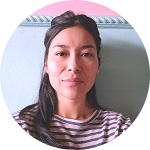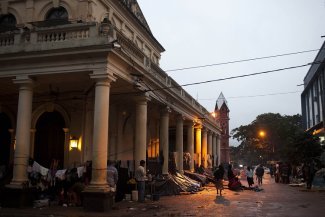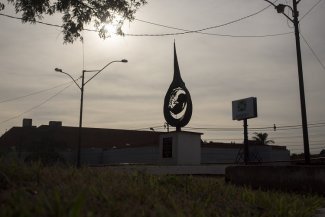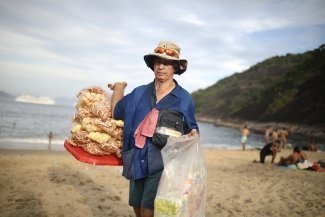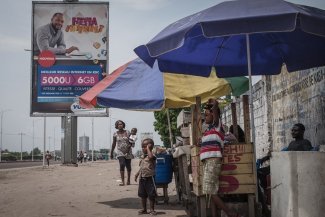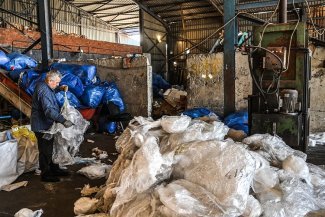As Santiago Peña’s tenure begins, women’s organisations are reflecting on the challenges that lie ahead with the new administration. As they well understand, making progress on women’s rights in a country deeply rooted in machismo and patriarchy and shaped by religious fundamentalism will be no easy task.
“Women are the backbone of this country’s economy, especially poor women. We are the ones who perform care work in our families, in our communities and throughout the country,” says Perla Álvarez, a leading activist with the Organisation of Peasant and Indigenous Women (Conamuri) and a member of CLOC-Via Campesina. “We are faced with powerful male chauvinist political forces in this country who do not value women, especially politically, and we have to keep building alliances at the national level.”
Paraguay rarely appears in international headlines. Last April, however, the Southern Cone country garnered some attention when Paraguayans elected 44-year-old conservative economist Santiago Peña to the presidency. Peña took office on 15 August. His victory means that the long-ruling Colorado Party will maintain its grip on power. With the exception of the presidency of Fernando Lugo (2008-2012), the party has governed Paraguay without interruption for the last seven decades (during both dictatorship and democracy).
Throughout its years in power, the Colorado Party has been distinguished by a conservative approach to both economic issues (supporting free market policies, encouraging foreign investment, advocating liberalisation and privatisation to boost the economy) and social issues (maintaining controversial positions on women’s rights, the LGTBQI+ community, abortion and sex education).
As Peña’s tenure begins, women’s organisations are reflecting on the challenges that lie ahead with the new administration. As they well understand, making progress on women’s rights in a country deeply rooted in machismo and patriarchy and shaped by religious fundamentalism will be no easy task.
“Whether they are in cities or rural areas, women all over this country understand that this is a society in which we face abuse simply for being women. Women in our society are punished for their desire to be free, independent and able to participate. This has only gotten worse in recent times,” says Álvarez.
According to Álvarez, three factors are vital to understanding the significant inequalities and high rates of violence that women in Paraguay face: land tenure, lack of comprehensive sexual education, and structural and symbolic violence.
Women take care of the land but they are the first to be expelled from it
“The land issue is probably the core of all the social problems we have in the country,” Álvarez tells Equal Times. As she explains, many of these problems originated during the dictatorship of Alfredo Stroessner (1954-1989), when land was given “to soldiers and businessmen sympathetic to the regime as payment for their loyalty”. This resulted in a steady and ongoing decline of rural communities.
According to a report by the Truth and Justice Commission (CVJ), during the dictatorship, irregular land concessions accounted for 64.1 per cent of the total. Of these, 3,054 plots (1,507,535 hectares) are in the eastern region and 1,178 plots (6,298,834 hectares) in the western region. In several cases, as the CVJ notes, the same person received several plots of land.
Even after the fall of the regime, another almost one million hectares were illegally granted until 2003, amounting to a total of around 8 million hectares – 36 per cent of the national agricultural area and half of the eastern region. Today, these lands are dedicated to “agribusiness, agro-export, whether it’s monoculture of soya, wheat or maize, or to livestock production, both of which are destined for export rather than feeding the country,” says Álvarez.
“And who are the first people to be affected by the hollowing out of rural areas and the advance of capitalism in the countryside? Women. They are the first to be expelled from their lands. They are the ones who go to the cities to work as domestic workers and in other trades. They are the ones who migrate abroad in search of opportunities, where they work precarious jobs to support their families,” she says.
Gender inequality in land tenure is another challenge in the South American country. Throughout its history, land ownership and access to land has unequally benefitted men. This disparity has led to both the cultural and social barriers that women face, as well as more tangible obstacles, such as legal hurdles.
“In the case of divorce or separation, it is generally women who are left without land,” as it is usually registered in the man’s name, explains Álvarez.
Comprehensive sex education is urgently needed
“In addition to being very conservative, Paraguay has a strong double standard when it comes to subjects that are too taboo to be discussed. Examples include the decriminalisation of abortion and comprehensive sex education. Additionally, a 2017 resolution by the Ministry of Education prohibits educational materials covering gender perspectives. In practice, this resolution has been used to persecute teachers who wish to address such issues,” says Mirta Moragas, lawyer and founder of Consultorio Jurídico Feminista.
As the interviewees for this article explain, Paraguay’s 2017 legislation banning the dissemination and use of materials on “gender theory and/or ideology” can be partly attributed to the role played by religious groups. Although the country’s constitution guarantees religious and ideological freedom, in practice, state institutions are strongly influenced by church-affiliated organisations and ultra-conservative groups (such as pro-life or pro-family groups). This influence has hindered the advancement of laws and public policies aimed at addressing or mitigating the country’s deep structural inequalities.
As Moragas argues: “Paraguay has become a laboratory for anti-gender and anti-rights ideas” in the region, a fact she attributes to two fundamental factors: the country’s relative invisibility on the international stage and its profound ideological conservatism.
One emblematic example, according to Moragas, is the law that allows for unborn embryos and foetuses to be registered with a name on a death certificate. This controversial legislation, which originated in Paraguay and was subsequently adopted by other countries, reflects the influence of groups linked mostly to evangelical churches and the Catholic Church, both which have consolidated their influence and agenda in the country’s political and social spheres.
As a result, Álvarez explains, sex education has become “one of the greatest concerns expressed by many social sectors regarding the need to guarantee the healthy and safe development of new generations”. According to Álvarez, the persistence of societal taboos not only perpetuates ignorance, misinformation and gender stereotypes, but also contributes to high rates of teenage pregnancy, sexually transmitted diseases and gender-based violence.
“We are one of the countries with the highest rates of pregnancy among girls and adolescents. We cannot under any circumstances justify girls becoming mothers in this day and age. It means that we are a society that tolerates the abuse and rape of girls and adolescents,” she stresses.
Structural violence
According to Álvarez, the forms of violence that Paraguayan women face often transcend individual experience and are rooted in the systemic injustices from which they disproportionately suffer. These include limited access to education, limited job opportunities, a persistent wage gap and low representation in leadership positions. This is notable despite the fact that Paraguay has signed international agreements, such as the ILO convention on equal pay. However, it has yet to ratify Convention 190, adopted in 2019, which protects all people from violence and harassment at the workplace.
“We have a very macho culture. While it’s true that there have been regulatory advances for recognition and equality, in practice women are still not equal, we still earn 20 per cent less than men. Paraguay has no law against all forms of discrimination, meaning above all that it has no complaint mechanism in cases of discrimination and a general lack of recognition of women’s rights,” adds Moragas.
At the same time, women face domestic violence and sexual abuse, the most tragic manifestation of which is femicide. This is aggravated by widespread impunity, difficulty in accessing justice, obstacles to reporting and a scarcity of resources for their protection. According to data from the Public Prosecutor’s Office, in the first quarter of 2023 alone, a total of 17 femicides were registered in Paraguay, a high figure in a country of just over 6 million inhabitants.
“When we call the institutions [...] responsible for women’s rights, they tell us that they have no resources. The police, the courts, the Secretariat of the Ministry of Women’s Affairs have no resources or capacity, the latter being a regulatory body rather than an operational one. So the state makes excuses for not guaranteeing equality for women, i.e. respecting for our rights,” says Álvarez.
Women prepare for the struggles ahead
“The main risk is [the government of Santiago Peña] adopting a discourse of hegemonic fundamentalism, pro-life, patriotism, God and family. This is a truly frightening discourse as it favours regression in the recognition of women’s autonomy at all levels, in terms of health, in terms of decisions about their bodies, but also in terms of political participation,” says Álvarez.
“There are really no favourable expectations. This is going to be above all a time of resistance for women and minority groups,” adds Moragas.
In a country dominated for decades by a conservative party and rooted in patriarchal, sexist and religious traditions, the interviewees foresee few advances in women’s rights. Barring surprises, they anticipate the “continuation and strengthening of existing inequalities”. Álvarez stresses the importance of civil society and women’s organisations “returning to the rearguard” and maintaining constant vigilance in order to spot potential radical tendencies and setbacks that threaten the modest progress made on the road to a more just and inclusive Paraguayan society.



